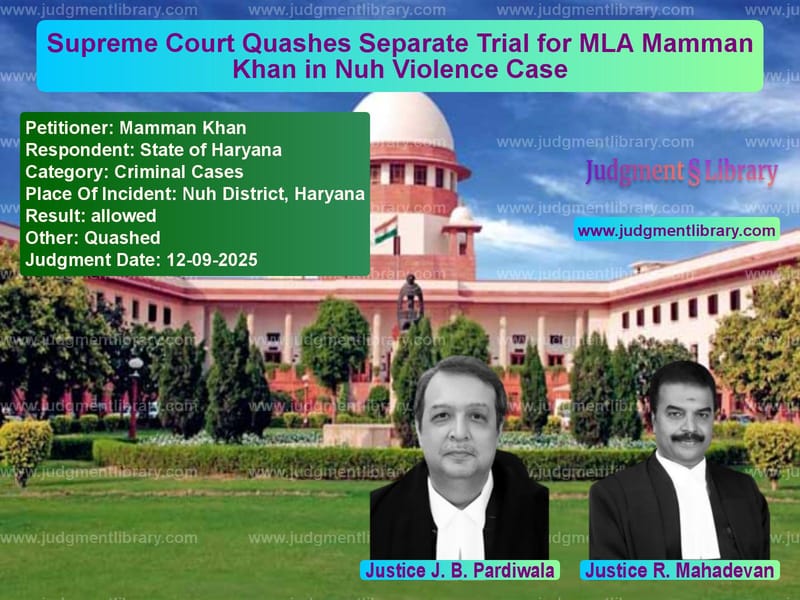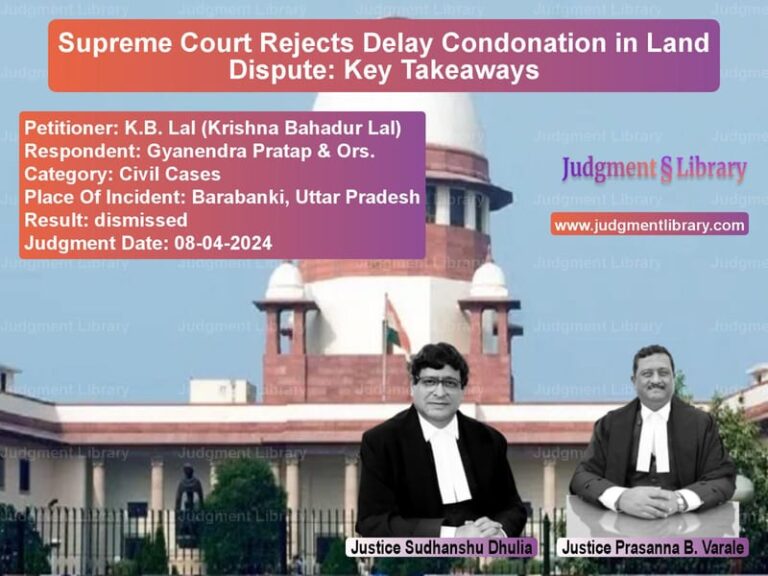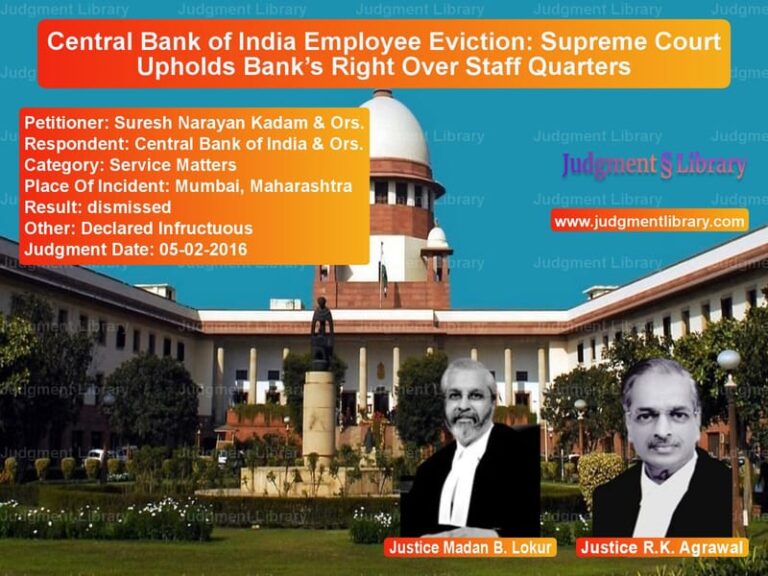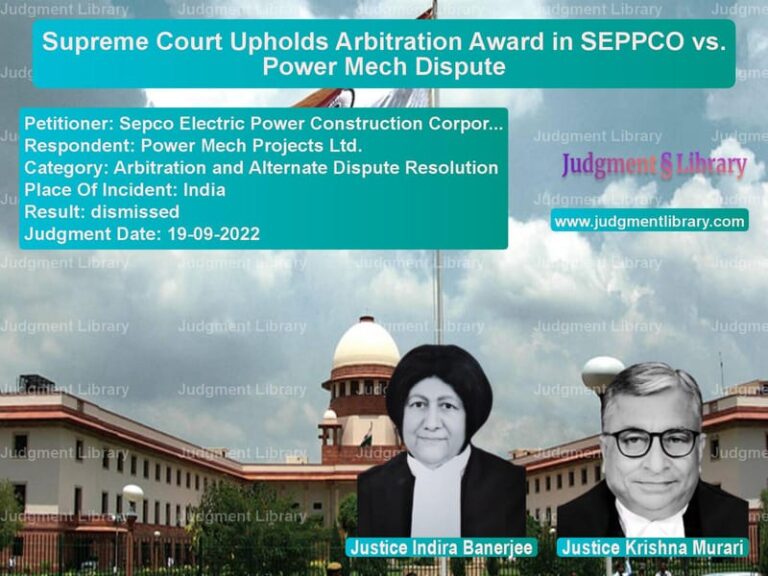Supreme Court Quashes Separate Trial for MLA Mamman Khan in Nuh Violence Case
In a significant judgment that reinforces the principle of equality before law, the Supreme Court of India has set aside the separate trial ordered for Haryana MLA Mamman Khan in the Nuh communal violence cases. The judgment delivered on September 12, 2025, by a bench comprising Justices J.B. Pardiwala and R. Mahadevan, strongly emphasizes that a person’s political status cannot justify deviation from established legal procedures. The Court’s decision came in response to appeals filed by Mamman Khan, a sitting MLA from Ferozepur Jhirka Constituency, who challenged the segregation of his trial from other accused in FIR Nos. 149 and 150 of 2023 related to large-scale communal violence that erupted in Nuh District on July 31, 2023.
The case originated from two FIRs registered at Police Station Nagina, District Nuh, alleging serious offenses including rioting, dacoity, criminal conspiracy, and mischief by fire. The prosecution’s case was built on the theory of an overarching conspiracy involving all accused persons, with evidence comprising call detail records, electronic communications, video footage, witness statements, and forensic reports. Despite this unified nature of allegations, the Additional Sessions Judge, Nuh, passed orders on August 28, 2024, and September 2, 2024, directing segregation of Mamman Khan’s trial from other co-accused and requiring the police to file a separate charge sheet against him.
The appellant’s senior counsel argued vigorously against this segregation, contending that “the trial Court directed segregation of the appellant’s trial solely on the ground that he is a sitting MLA, which reasoning is arbitrary, legally untenable, and amounts to a miscarriage of justice.” He emphasized that Section 223(d) of the Code of Criminal Procedure provides that persons accused of the same offence committed in the course of the same transaction shall be tried jointly. The counsel further argued that “joint trials are the rule, and separate trials are permissible only in exceptional circumstances expressly contemplated by law.” He pointed out that in the present case, the alleged offences, including rioting and conspiracy under Section 120B IPC, arose from the same incident, making it impermissible to try the alleged conspirator separately from the principal perpetrators.
The appellant’s counsel also challenged the trial court’s reliance on the Supreme Court’s directions in Ashwini Kumar Upadhyay v. Union of India, arguing that “those directions merely call for prioritization of trials involving MPs/MLAs for expeditious disposal and do not permit deviation from the statutory scheme, nor authorize separate charge-sheets or trials solely on the basis of accused’s political status.” He warned that segregation would enable the prosecution to tailor its evidence based on prior cross-examination, causing serious prejudice to the appellant and violating his fundamental right to a fair trial under Article 21 of the Constitution.
On the other side, the respondent-State of Haryana defended the segregation order, arguing that it was necessitated to ensure judicial efficiency. The state’s counsel contended that “the presence of 43 accused in FIR No.149 and 28 accused in FIR No.150 had rendered the conduct of a joint trial logistically and procedurally cumbersome.” He pointed out that repeated non-appearance of certain co-accused had already resulted in considerable delay, and the segregation was intended to prevent further delay while facilitating early disposal. The respondent also argued that under Section 218 Cr.P.C., the general rule is that each offence shall be tried separately, and while Section 223 enables joint trials, it is couched in discretionary terms that must be applied depending on circumstances.
The Supreme Court, after carefully examining the trial court’s orders, found that the segregation was directed solely on account of the appellant’s status as an MLA. The Court noted that the trial court’s order dated August 28, 2024, explicitly stated: “In the present case, one of the accused namely Sh. Mamman Khan is MLA of Haryana. The present case is not progressing on account of absence of one accused or the other. On the other hand, as per direction issued by Hon’ble Supreme Court, the cases of MPs/MLAs are to be decided on priority basis by taking up the case on day to day basis.” Similarly, the order dated September 2, 2024, recorded: “One of the accused namely Mamman Khan is sitting MLA of Haryana and therefore, his case is to be taken up on day to day basis as per instructions issued by Hon’ble Supreme Court from time to time.”
The Supreme Court found this reasoning fundamentally flawed. The Court held that “the reliance placed by the trial Court and the High Court on Ashwini Kumar Upadhyay (supra) appears to be misplaced.” While acknowledging that the said judgment emphasizes the need for expeditious disposal of criminal cases involving MPs/MLAs, the Court clarified that “they do not confer any procedural disadvantage upon an accused legislator, nor do they authorise deviation from the mandatory legal norms governing joint trials.”
The Court extensively analyzed the statutory scheme under Cr.P.C., particularly Sections 218 to 223, which govern joinder and separation of charges and trials. The Court emphasized that “the legislative intent underlying these provisions is three-fold: (i) to prevent multiplicity of proceedings, (ii) to avoid the risk of conflicting judgments on the same evidence, and (iii) to promote judicial economy while ensuring fairness to the accused.” The Court found that in the present case, there was no allegation that the acts attributed to the appellant arose from a distinct transaction, or that a joint trial would prejudice the prosecution.
The Supreme Court also noted a serious procedural lapse – the segregation was ordered suo motu without issuing notice to the appellant or providing him an opportunity of hearing. The Court strongly condemned this approach, stating that “Natural justice requires that the party likely to be affected by an order must have prior notice and a fair opportunity to present objections.” The Court held that “A unilateral order for a separate charge sheet and segregated trial, passed without notice or application, violates the basic principles of procedural fairness inherent in Article 21.”
Perhaps the most significant aspect of the judgment is the Court’s firm rejection of the idea that a person’s political status can justify differential treatment in criminal proceedings. The Court categorically stated that “the appellant’s status as a sitting MLA cannot, by itself, justify a separate trial. All accused stand equal before the law, and preferential segregation militates against the equality principle enshrined in Article 14.” The Court elaborated this constitutional principle, noting that “This principle extends beyond mere formal equality and requires that legal procedures be applied fairly and uniformly, irrespective of an individual’s public position or status.”
The Court also pointed out the practical problems with segregation, observing that “Separate trials would necessarily involve recalling the same witnesses, resulting in duplication, delay, and the risk of inconsistent findings.” This, the Court noted, would defeat the very objective of expeditious disposal that the trial court claimed to be pursuing.
In its concluding observations, the Supreme Court set aside the impugned orders of the trial court and the High Court, quashing the direction to file a separate charge sheet against the appellant and the consequential segregation of his trial. The matter was remitted to the trial court with a direction to conduct a joint trial of the appellant along with the co-accused. The Court, however, clarified that “The trial Court shall be at liberty to regulate the schedule of proceedings to ensure expeditious disposal, but shall do so, without compromising procedural safeguards and only after hearing all concerned parties.”
This judgment serves as a powerful reminder that while expeditious disposal of cases is desirable, it cannot be achieved at the cost of procedural fairness and the fundamental principle of equality before law. The Supreme Court’s firm stance against special treatment for elected representatives reinforces the foundational values of our constitutional democracy and strengthens public confidence in the impartiality of our judicial system.
Petitioner Name: Mamman Khan.Respondent Name: State of Haryana.Judgment By: Justice J. B. Pardiwala, Justice R. Mahadevan.Place Of Incident: Nuh District, Haryana.Judgment Date: 12-09-2025.Result: allowed.
Don’t miss out on the full details! Download the complete judgment in PDF format below and gain valuable insights instantly!
Download Judgment: mamman-khan-vs-state-of-haryana-supreme-court-of-india-judgment-dated-12-09-2025.pdf
Directly Download Judgment: Directly download this Judgment
See all petitions in Criminal Conspiracy
See all petitions in Bail and Anticipatory Bail
See all petitions in Custodial Deaths and Police Misconduct
See all petitions in Legal Malpractice
See all petitions in Judgment by J.B. Pardiwala
See all petitions in Judgment by R. Mahadevan
See all petitions in allowed
See all petitions in Quashed
See all petitions in supreme court of India judgments September 2025
See all petitions in 2025 judgments
See all posts in Criminal Cases Category
See all allowed petitions in Criminal Cases Category
See all Dismissed petitions in Criminal Cases Category
See all partially allowed petitions in Criminal Cases Category







